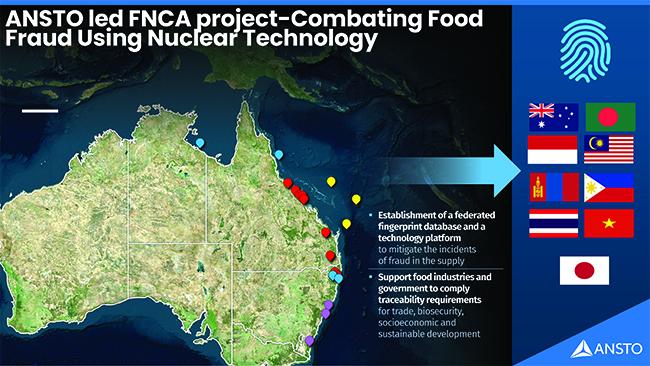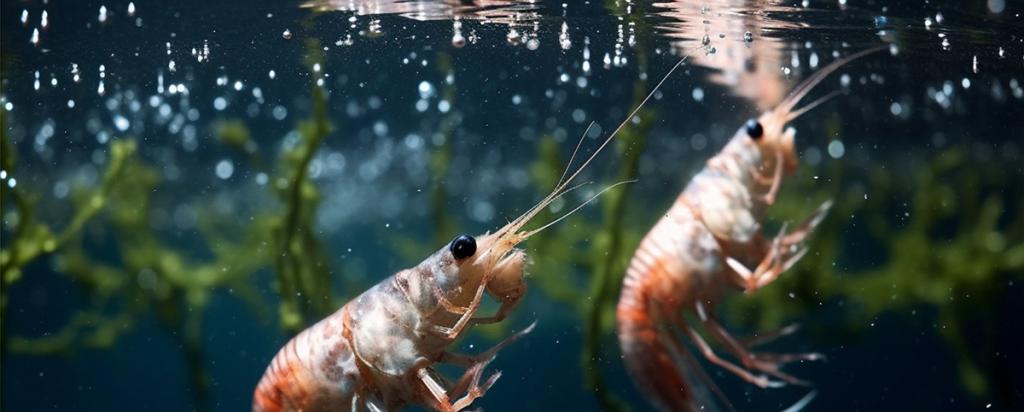

Published on the 22nd December 2023 by ANSTO Staff
ANSTO hosted an online training workshop for the Forum for Nuclear Cooperation in Asia (FNCA) project Combating Food Fraud Using Nuclear Technology (CFF) in early December.
Dr Debashish Mazumder, the Project Lead at ANSTO, welcomed representatives from FNCA member states and facilitated the program.

The project aims to undertake research to establish a food provenance technology platform and federated data connectivity for key priority food items to mitigate the incidents of fraud in the supply chain in the eight member states in the Pacific region.
The outcomes of this project will benefit the Pacific region through the development of scientific capacity and expertise of the participating countries in the application of nuclear analysis techniques for mitigating food traceability challenges in trade.
In the session, participants discussed the implementation plan for the CFF project in 2024 including a selection of food items, sample collection and analysis strategy for the development of a provenance technology platform. The meeting also had a training and knowledge-sharing session facilitated by Patricia Gadd to discuss the application of nuclear technology to food fraud mitigation.
The meeting was chaired by Natascha Spark, Senior Manager, Government and International Relations and IAEA RCA National Representative and RCA Chair.
“The training course is part of a larger effort towards social and economic development in our region through the application of nuclear science and technology,” she said.
Other presenters included Dr Karina Meredith, Mr Erik Poole, Innovation and Technology Manager at Sydney Fish Markets, Mr Wade Tomoaki, FNCA Advisor of Japan as well as members of the Food provenance team at ANSTO.
Prof Jes Sammut, Deputy Dean for External Engagement, leads the UNSW Aquaculture Research Group and is the Deputy Director (International) of the Centre for Marine Science and Innovation at UNSW chaired a session to discuss the implementation plan. FNCA country representatives from Bangladesh, Indonesia, Malaysia, Mongolia the Philippines, Thailand and Vietnam shared their strategies. The group achieved a consensus on activities.
Dr Mazumder shared the research strategy.
The group agreed to focus on seafood (Tiger prawn) as a common food item to be used for the collection of baseline data connectivity to support the food provenance technology.
In addition to Tiger prawn other food items were also suggested for the project from the respective countries, including spice powder (Bangladesh), barramundi and rice (Indonesia), mango (Malaysia), honey and vegetable oil (Mongolia), Mango, coffee cacao, honey and Halal organic food (Philippines), coconut juice and mango (Thailand) and ST25 rice (Vietnam).
Participating countries agreed to provide ANSTO tiger prawn samples in 2024, including wild-caught and farmed from different geographical regions.
ANSTO will collect fingerprint data on the samples using the handheld X-ray fluorescence scanner to connect with ANSTO’s seafood database and provide analytical results to the respective countries for traceability purposes.
A research publication will be prepared by Dr Mazumder with country representatives as co-authors.
Further training on data analysis, interpretation of results and database development will be scheduled.
Mr Tomoaki stated that Japan would participate in the project as an observer and contribute to the project through Dr Yaeko Suzuki of the National Agriculture and Food Research Organization (NARO by providing stable isotope analytical support.


